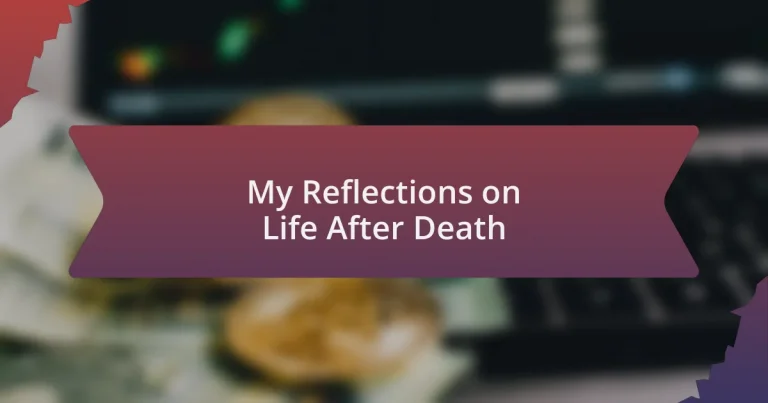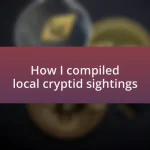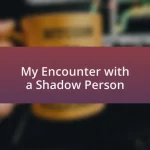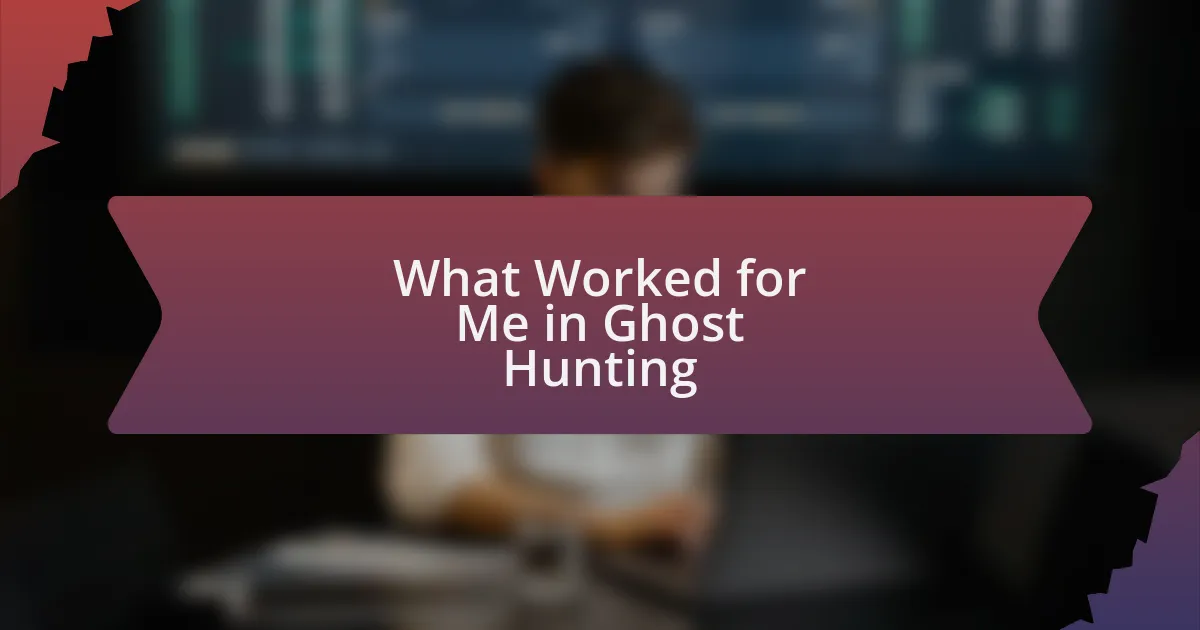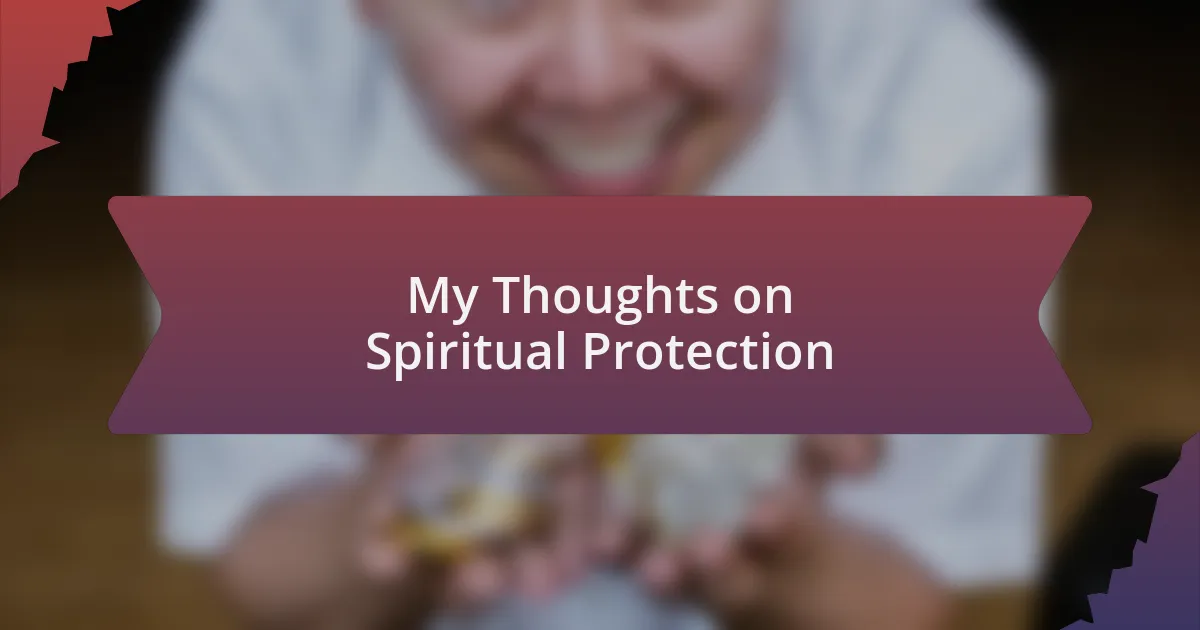Key takeaways:
- The concept of life after death is explored as a continuation of existence, influencing our understanding of life today.
- Personal experiences with the unseen can serve as connections to departed loved ones, sparking curiosity about the afterlife.
- Death profoundly affects the living, reshaping relationships and fostering shared experiences of grief that unite communities.
- Conversations with those who have encountered the afterlife highlight the intertwining of personal experiences, spirituality, and scientific inquiry.
Author: Evelyn Hartman
Bio: Evelyn Hartman is a contemporary author known for her evocative storytelling and rich character development. With a background in psychology, she weaves intricate narratives that explore the complexities of human relationships and personal growth. Her debut novel, “Whispers in the Wind,” garnered critical acclaim and established her as a powerful voice in modern literature. Evelyn resides in the Pacific Northwest, where she draws inspiration from the vibrant landscapes and diverse communities around her. When she’s not writing, she enjoys hiking, gardening, and spending time with her two rescue dogs.
Understanding life after death
Understanding life after death is a profound journey that many people feel compelled to explore. I remember a time when I lost a close friend, and I was struck by the comforting thought that perhaps there was more after life. Wouldn’t it be reassuring to believe that our loved ones are still out there, in some form, guiding us?
Through conversations with those who have had near-death experiences, I’ve learned that the interpretations of these events can vary widely. These accounts often provide a glimpse into the mysterious nature of existence beyond the physical realm. It makes me wonder: could our perceptions be limited by our earthly experiences, or is there an expansive understanding just waiting to be uncovered?
As I delve deeper into various philosophies and spiritual beliefs, I come across the idea that life after death is not merely an ending but rather a continuation. This perspective has shifted my understanding and opened my mind to possibilities I hadn’t considered before. Isn’t it fascinating how exploring these thoughts can transform our approach to life today?
Exploring the paranormal concepts
When I think about the realms beyond our physical existence, I often find myself pondering the concept of spirits. My grandmother used to tell me stories of encounters with loved ones who had passed away, experiences that inspired a sense of wonder in my young mind. Could these moments be fleeting connections to a world we are yet to fully understand?
Engaging with various paranormal concepts has made me reflect on how different cultures view death and the afterlife. For instance, some traditions emphasize the continuity of the soul while others focus on reincarnation; these diverse beliefs speak volumes about human curiosity and our yearning for answers. What if our essence really is part of a larger tapestry, woven together through time and space?
I often listen to testimonies from those who’ve claimed to see or communicate with spirits, and it stirs something deep within me. I recall a chilling recount from a friend who insisted they felt their late father’s presence during a significant life moment. How can we quantify these experiences? It seems that, irrespective of the scientific explanations, there’s an undeniable emotional truth that resonates with many of us, pushing the boundaries of what we consider possible.
Personal experiences with the unseen
Personal experiences with the unseen often leave an indelible mark on our lives, shaping how we perceive the intangible world around us. I remember a quiet evening when I was alone at home and felt an inexplicable chill sweep across the room. It was as if a presence lingered, subtly reminding me of my late cat who had shared my life for many years. Did I really sense her spirit in that moment, or was it simply my mind playing tricks?
Another profound encounter occurred during a family gathering. While reminiscing about my grandfather, a flickering light bulb caught my attention, buzzing slightly as if responding to our conversation. I chuckled nervously, thinking it was just an old fixture having issues. But could it have been a playful sign from him, reminding us that he’s still part of our lives in some way? Moments like these blur the lines between skepticism and belief.
I’ve often pondered if these experiences serve as bridges, connecting us to those who have departed. One night, while meditating, I felt an overwhelming sense of love and warmth, as if someone was embracing me from behind. Was this my imagination, or could it be a glimpse into a realm beyond our understanding? These questions linger, inviting curiosity while anchoring me to the belief that our connections to the unseen can reveal profound truths about existence.
How death affects the living
The impact of death on the living can be profound and multifaceted. I recall the day I learned of a close friend’s passing. It felt as though a great weight pressed upon my chest, making it hard to breathe. Grief isn’t just a fleeting emotion; it’s a lingering echo that reshapes how we interact with the world and each other.
Each time I revisit my childhood home, I’m reminded of the bittersweet memories tied to my late grandmother. Her absence creates a void that colors every corner of that house, filling it with an aching nostalgia. How do we navigate the silence that follows the loss of someone who shaped so much of our lives? For me, the answer lies in the stories we share and the love we continue to express in their honor.
Sometimes, I find myself questioning if the pain of loss is a necessary part of our journey. When I attend memorials, surrounded by others who are grieving, I notice a unique bond forming. It’s in those moments that we become more than just individuals; we become a collective, sharing not only our sorrow but also our cherished memories. Isn’t it fascinating how death, in its silence, has the incredible power to unite us in ways nothing else can?
Reflections on life beyond
Reflecting on life beyond often stirs a mixture of curiosity and apprehension. I vividly remember a night spent stargazing with friends, where one of them shared a profound experience they had during a near-death encounter. They described a feeling of immense peace and a vibrant light, which prompted all of us to ask: could our loved ones truly be watching over us? Such moments make me wonder about the nature of existence after life and the connections that might transcend physical boundaries.
I often think about the stories that people recount after facing death’s door. A colleague once shared how, post-recovery from a grave illness, they felt a newfound appreciation for life’s subtleties. Simple joys, like the warmth of sunlight or the laughter of children, carried a deeper meaning. Isn’t it intriguing how near-death experiences can reshape our understanding of not just life, but what might come next, urging us to reconsider our priorities?
Engaging with the idea of life beyond, I’m reminded of the candlelight vigils I attended for those we lost too soon. Each flickering flame seemed to dance with the spirit of remembrance, illuminating our shared hope for an existence beyond what we see. I can’t help but ask myself, how do these ceremonies play a role in our belief systems? Personally, I find comfort in the thought that death isn’t an end, but rather a transformation—an opportunity to glimpse what lies beyond the veil.
Interviewing those who know
When I speak to those who have had personal encounters with the afterlife, their stories often create a profound connection. I recall a conversation with a bereaved mother who swore she felt her son’s presence during significant moments. She described it as a comforting embrace, and it made me wonder: do these experiences provide us with a bridge to those we’ve lost? Hearing her share such intimate details reminded me that love may transcend even the boundaries of mortality.
I’ve explored interviews with mediums, who claim they can communicate with spirits. Their confidence in relaying messages from the other side is striking. One medium shared a heartwarming instance where she helped a grieving father convey his unspoken feelings to his departed child. It made me reflect on the potential of these connections—could it be that, through these skilled individuals, we glimpse glimpses of life after death? Their insights often challenge our understanding, compelling us to consider what truly lies beyond our earthly existence.
Moreover, I’ve had the chance to talk with scientists who study near-death experiences. Their findings often intrigue me, blending the mystical with the empirical. I remember one researcher discussing the brain’s functions during trauma, yet also acknowledging the profound changes people undergo post-experience. This tension between science and spirituality raises essential questions: can we ever fully explain the unexplainable? As I dive deeper into these conversations, I find myself captivated by the myriad ways human experiences can shape our beliefs about life after death.
Lessons learned from the unknown
The unknown often teaches us resilience in ways we never anticipated. I once spoke with a friend who experienced the loss of a loved one and described how that grief propelled her to seek answers. It was a transformative process; she discovered that confronting her fears about death opened her eyes to a new sense of purpose. Isn’t it incredible how facing the unknown can push us to grow in unexpected ways?
One lesson I’ve embraced is the idea that uncertainty can ignite curiosity. I remember attending a lecture on the concept of reincarnation, where the speaker shared anecdotes about people recalling past lives. Listening to these stories filled me with a sense of wonder; they suggested that our souls may journey through various experiences. How fascinating to think that our existence might be woven into a larger tapestry that goes beyond our current life!
The unknown also invites us to connect with others on a deeper level. After joining a local support group for those grieving, I was struck by the stories we shared—the laughter, the tears, the unanswerable questions. It dawned on me that when we face the mysteries of life and death together, we create a bond that transcends understanding. In those moments, I wondered: could it be that the shared experience of grappling with the unknown is what ultimately unites us all?
